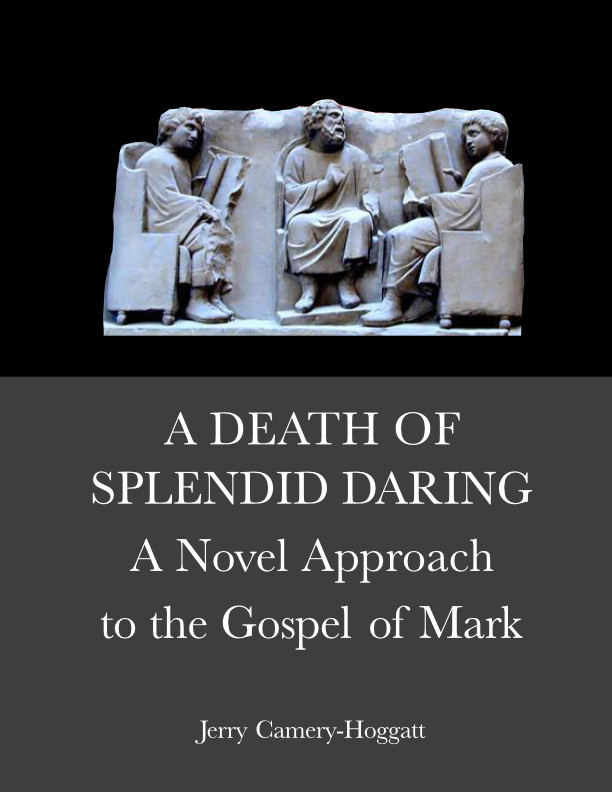
A Death of Splendid Daring is a novel about the Gospel of Mark. Set in 1st Century Rome, the plot revolves around a single household in which some but not all are Christians. There’s a desperate, secret search for an infant with a twisted leg who’s been discarded in the forum by the family’s paterfamilias. There’s a homicide for which the murderer has been found innocent in a court of law, the victim’s father seeking revenge but held in check by the immense power of one of the main characters — a senator. In the background, there’s the death of a Jewish-Christian in the war in Judaea, his father’s grief and rage exploding in an act of desecration against the Roman temple of Mars, the subsequent trial and its fateful consequences.
Fully embroiled in these circumstances, the family acquires a copy of Mark, about which they argue with more than a little ferocity. Since they’re not all Christians, and despite their own intentions, the arguments pull them ever deeper into the message of Mark’s extraordinary book.
Question One
What kind of resource would you need if you wanted to experience the drama and the trauma that pulses in First Century Rome during the writing of Mark’s gospel?
Answer
A Death of Splendid Daring is just that story.
Tell me more …
A Death of Splendid Daring is an historical novel that transports readers to first-century Rome, where the conflicting worldviews that gave rise to the early church were at points radically different from the Christianity of today.
Okay, even more...
Imagine seven First Century Romans who are drawn into a debate about the meaning of the Gospel of Mark. Two are women; four are men; one is a teenage boy. Four are Christians; three are not. One has military background and has lost a hand in the war in Britannia. One is a political force in the city. Two are trained in Stoic philosophy; one is a Neoplatonist; one a follower of the Mystery Religions—a secretive cult that required immersion in the blood of a dying bull. Two have studied the Jewish scriptures. One has served on the Roman board that regulates the foreign cults in the city. One has lived in the Galilee, reads Latin, Greek, Hebrew and Aramaic, and possesses a fine library of Jewish texts. Two are illiterate and were raised in the city’s ghetto. Three are Patricians and can trace their ancestry back more than six generations. One is a classically educated slave from North Africa.
Thrust together by circumstances of war and family honor, these members of a single Roman household are forced to grapple with a world of extraordinary trouble. Imagine what such a group might find in the gospel to help them cope with the turmoil of a city in chaos at the height of the Neronian persecution.
This is a new and innovative way of approaching Mark’s gospel — not so much a retelling of the gospel as a street-level reading of the gospel by a group of first-century Romans who are caught up in the struggles that grip the city. The story is unabashedly exegetical and theological, but with a novel twist: The plot rests as much on theological discoveries as it does upon historical and cultural events.
Question Two
Answer
“Universities and seminaries package most of what they do in outline form,” Jerry says, “but most people navigate the journeys of faith by telling and listening to stories.” That conviction is at the core of his life’s work. “I try to write prose that sings for people who’d never pick up a book of systematic theology. I use storytelling as a vehicle for achieving that.”
This approach to the Gospel of Mark is novel in both definitions of the word.
First, with captivating characters, intriguing plot, historical setting, engaging conflicts and resolutions, it is a novel in the literary genre sense of the word.
Second, this book is a new, original, one-of-a-kind—novel in the second meaning of the word–approach to the study of Mark’s gospel. This novel contains information normally found only in Bible commentaries and scholarly writings.
A Death of Splendid Daring: A Novel Approach to the Gospel of Mark offers a fascinating reading experience while making Biblical scholarship accessible to lay readers, seminarians, and pastors.
While the number of readers who are interested in the Bible is massive, overall reading practices are shifting dramatically. In addition to traditional print, we now have digital books, audio books, and podcasts. There’s little serious biblical scholarship that’s adapted to these new formats. The narrative format I’ve employed thus affords multiple venues of access to a market not well served by any form of traditional commentary.
Question Three
Answer





and husband of a big-hearted, mother-of-the-whole-universe woman




